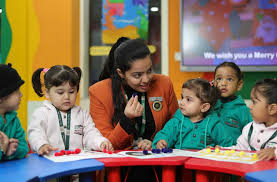
Diploma in Nursery Teacher Education
Diploma in Nursery Teacher Education
Year 1: Foundations & Building Blocks
- Early Childhood Foundations & Philosophy
- Philosophy and principles of early childhood education, historical perspectives, the role and responsibilities of nursery teachers.
- Major developmental stages (physical, cognitive, emotional, social).
- Influential theories (Piaget, Vygotsky, Erikson).
- Understanding children’s behavior, needs, and observational techniques.
- Teaching Methods & Curriculum Planning
- Activity-based, play-way, Montessori, and thematic approaches.
- Designing age-appropriate curriculum, lesson and unit planning, use of teaching aids and multimedia
- Care: Health, Hygiene & Nutrition
- Basics of child health, hygiene practices, food and nutrition for young learners, first aid, and safety measures.
- Creative & Expressive Arts
- Encouraging creative arts including drawing, painting, music, crafts—integrating these into daily learning.
- Practical Engagement
- Introduction to lessons planning, crafting teaching aids, arts and crafts, rhymes, storytelling, and initial micro‑teaching.
Year 2: Advanced Integration & Practice
- Advanced Psychology & Personality Development
- Deeper exploration into educational psychology, personality development, human relations, and communication skills.
- School Management & Professionalism
- Fundamentals of school organization and management.
- Curriculum planning, programme organization, teacher education, & ethical teaching practices.
- Special Education & Inclusive Practices
- Working with children with special needs, gender sensitivity, diversity, non-discrimination, and inclusive environment strategies.
- Environmental & Technological Learning
- Environmental awareness, pollution studies.
- Application of educational technology and basic computer education for instruction.
- Assessment & Evaluation
- Observation-based formative and summative assessments.
- Reflective practices, use of portfolios, reporting progress, assessment-informed instruction.
- Hands‑On Training: Internship & Project
- In-depth internship in preschools.
- Project work, micro-teaching, case studies, teaching practice, viva, and internal assessments.

